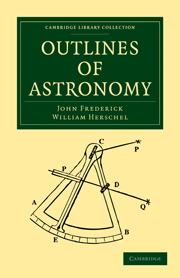CHAPTER XVI
Published online by Cambridge University Press: 05 July 2011
Summary
(819.) Now, for what purpose are we to suppose such magnificent bodies scattered through the abyss of space? Surely not to illuminate our nights, which an additional moon of the thousandth part of the size of our own Would do much better, nor to sparkle as a pageant void of meaning and reality, and bewilder us among vain conjectures. Useful, it is true, they are to man as points of exact and permanent reference; but he must have studied astronomy to little purpose, who can suppose man to be the only object of his Creator's care, or who does not see in the vast and wonderful apparatus around us provision for other races of animated beings. The planets, as we have seen, derive their lightfrom the sun; but that cannot be the case with the stars. These doubtless, then, are themselves suns, and may, perhaps, each in its sphere, be the presiding center round which other planets, or bodies of which we can form no conception from any analogy offered by our own system, may be circulating.
(820.) Analogies, however, more than conjectural, are not wanting to indicate a correspondence between the dynamical laws which prevail in the remote regions of the stars and those which govern the motions of our own system. Wherever we can trace the law of periodicity—the regular recurrence of the same phenomena in the same times—we are strongly impressed with the idea of rotatory or orbitual motion. Among the stars are several which, though no way distinguishable from others by any apparent change of place, nor by any difference of appearance in telescopes, yet undergo a more or less regular periodical increase and diminution of lustre, involving in one or two cases a complete extinction and revival.
- Type
- Chapter
- Information
- Outlines of Astronomy , pp. 554 - 590Publisher: Cambridge University PressPrint publication year: 2010First published in: 1864

